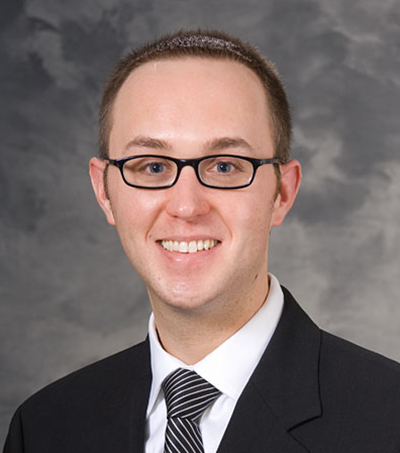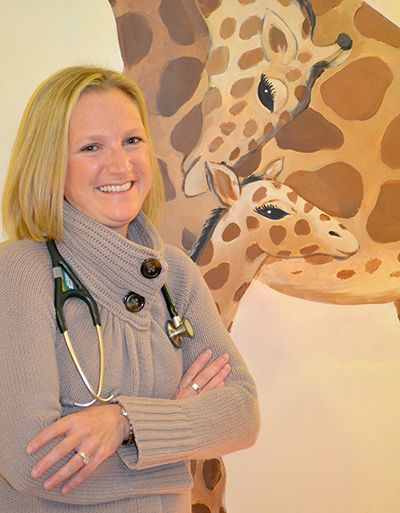At first glance, life after residency looks quite different for Department of Pediatrics graduates Daniel Schumacher, MD, MEd, and Megan Lederer, MD.
On the East Coast, Dr. Schumacher is a pediatric emergency medicine physician at Boston Medical Center, in the city’s historic South End. He’s an assistant professor at Boston University School of Medicine, and an associate director of the Boston Combined Residency Program in Pediatrics (BCRP).
In the Rockies, Dr. Lederer is a primary care pediatrician at a small private practice in suburban Denver. There, “Dr. Meg,” as she’s better known, cares for her young patients and raises her own small children.
Their journeys from Madison led to them to opposite ends of the country—and different places on the pediatrics spectrum—but for both, a love of teaching and outstanding training paved the way for success.
A Leader in Resident Education

Dr. Schumacher had a strong interest in teaching since medical school. It crystallized in 2009, when, while a chief resident here, he became a member of the Pediatrics Milestones Project Working Group.
A joint initiative of the Accreditation Council for Graduate Medical Education (ACGME) and the American Board of Pediatrics, the Pediatric Milestones Project aims to improve resident competency assessment and is a backbone for the ACGME’s Next Accreditation System.
Dr. Schumacher was selected as the group’s sole resident. “I expected I would just be providing the ‘learner perspective,’ but instead, I was a full and equal member of the team, working and publishing alongside well-established senior faculty in pediatrics medical education,” he recalled.
After his chief year, he went on to complete a fellowship in pediatric emergency medicine at Cincinnati Children’s Hospital Medical Center and a combined master’s degree in education from the University of Cincinnati.
In 2012, he arrived in Boston, where he now divides his time between pediatric emergency medicine practice and his role as one of four associate directors for the BCRP, a 145-resident program shared between Boston Medical Center and Boston Children’s Hospital.
There, Dr. Schumacher continues to build on his work with the Pediatric Milestone Project. He is shifting the BCRP’s methods of resident assessment from a rating-based system performed by faculty toward a process in which assessors and program leaders match their observations with descriptions of residents’ skills. “It’s a way to make assessments more meaningful so they help residents in their development,” he explained.
Looking back, Dr. Schumacher is grateful for the support of Department of Pediatrics Residency Director John Frohna, MD, MPH, and other mentors.
“Dr. Frohna set aside time just to talk to me about my development,” he shared. “He is a good role model for what a successful leader in resident education looks like, and one I still look to regularly today.”
‘Many People I Carry With Me’

In 2009, at the same time Dr. Schumacher was a chief resident, Dr. Lederer was a pediatrics intern who had just had her first baby.
“That might be the worst possible time to have a child,” she laughed. But Dr. Frohna assured her that they would make it work, and for the next three years, she balanced the demands of residency training and parenting a young child.
She developed clinical interests in general pediatrics and adolescent medicine, but it was her love of teaching that led her to become a chief resident.
Now, a year and a half later—and with a second child—Dr. Lederer works as a primary care pediatrician at a small practice in Denver. She sees patients four days per week and every third Saturday, and shares overnight call once a week with her colleagues.
Over the past five years, approximately half of the department’s residency graduates have chosen careers in primary care, said Dr. Frohna. Like Dr. Lederer, they use their teaching skills to help families navigate their children’s day-to-day health needs.
“I’m closer to work-life balance than I’ve ever been,” Dr. Lederer said. “I love the problem solving and relationships of primary care—it’s great to see families again and again as their children grow.”
She agrees with Dr. Schumacher that the department’s “rigorous yet relaxed” residency program—with its emphasis on mentorship—was great preparation for her career. In the future, she plans to carry on that tradition by precepting medical students in her own community.
Of her time in Madison, she recalled, “The residency program was small and informal enough that I got to have close relationships with many people—including some outstanding pediatric specialists—that I might not have had at a bigger program. There are many people from residency I carry with me.”